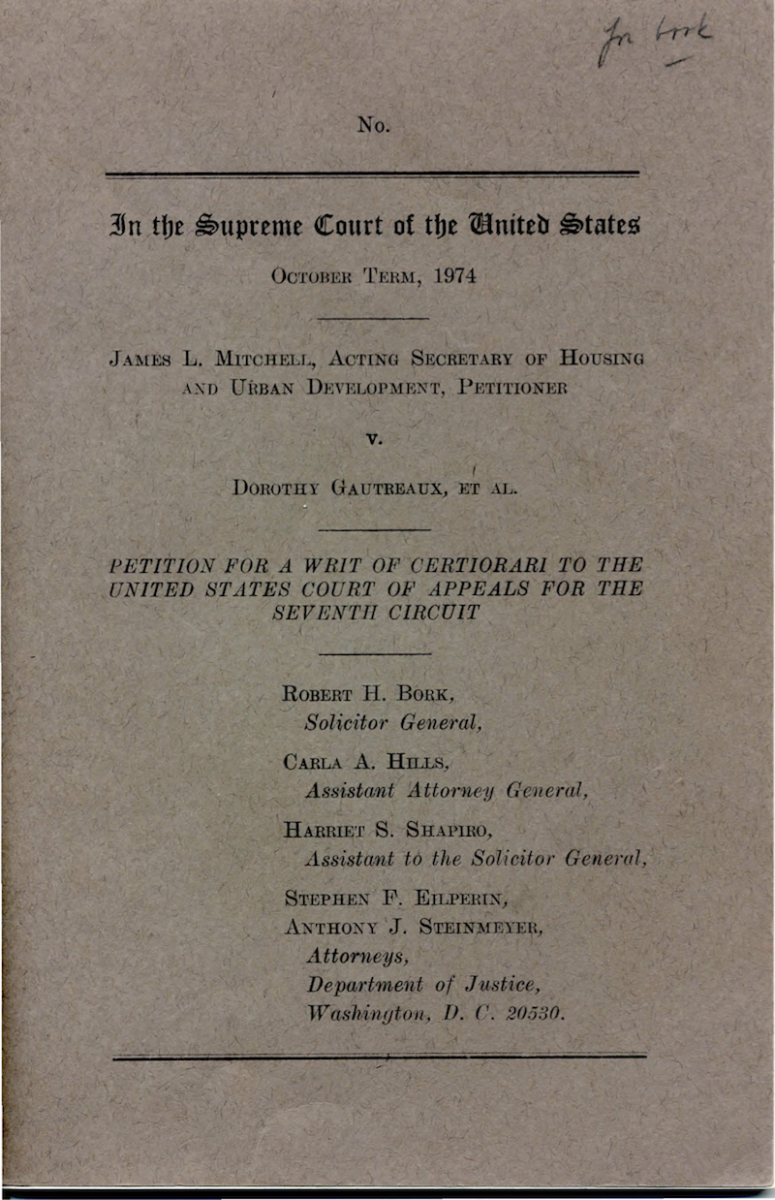The Supreme Court and the Gautreaux Assisted Housing Program
This post is the third entry in our series on the Gautreaux digital archive. Each of the posts in this series examines an important moment in the history of the Gautreaux lawsuit and considers how the case continues to influence housing policy in Chicago today. –Torsten K. Edstam, Ph.D.

Nearly a decade after Alexander Polikoff filed the complaints that initiated the Gautreaux lawsuit, he found himself before the Supreme Court arguing that a comprehensive metropolitan-wide housing plan was essential for remedying the discriminatory conduct of CHA and HUD. This Supreme Court hearing marks one of the most important moments in the long history of the Gautreaux litigation.
How did Gautreaux arrive at the Supreme Court ten years after the initial filing? What were the arguments in the hearing? And how did the results of the ruling affect subsidized housing policy and practice in the Chicago area afterwards?
On September 10, 1971 the Seventh Circuit Court of Appeals ruled that HUD violated the Fifth Amendment and the 1964 Civil Rights Act by knowingly funding CHA’s discriminatory housing program. Following this decision, the District Court ordered HUD to cooperate with CHA in the latter’s remedial duties under the Gautreaux judgment order, but rejected the Gautreaux plaintiffs’ plea that HUD be required to develop a plan for metropolitan-wide relief. On appeal from that disappointing District Court decision, on August 26, 1974 the Seventh Circuit ruled that a metropolitan relief order would be an appropriate remedy even though CHA’s discrimination had taken place in the city of Chicago only.
An important question the Seventh Circuit wrestled with was that only a year earlier the Supreme Court had ruled against inter-district relief in litigation seeking to desegregate Detroit’s schools. Even though the Seventh Circuit concluded that the case, Milliken v. Bradley, did not apply to Gautreaux, in February, 1975, HUD successfully used this issue to petition the Supreme Court for review.
On January 20, 1976, Polikoff and the attorneys for HUD met before the Supreme Court. While HUD attorneys asserted that Milliken v. Bradley precluded metropolitan relief in Gautreaux, Polikoff argued that Milliken did not govern and that a metropolitan-wide order against HUD would be appropriate.
Three months after the hearing, the Supreme Court issued a unanimous opinion in favor of the Gautreaux plaintiffs, authorizing metropolitan relief. The ruling set the stage for the launch of a landmark housing program—the Gautreaux Assisted Housing Program. This program was the first major housing mobility program in the nation and ultimately helped over 25,000 persons (some 7,100 families) move to new homes throughout the Chicago metropolitan area.
With thanks to the Oyez Project, you can listen to Polikoff’s actual arguments before the Supreme Court.
The next post in our Gautreaux series will take a closer look at the long-term effects of the remedial measures that resulted from the Supreme Court’s decision and how their influence has continued to shape public housing today both in Chicago and in cities across the country.
Back To Blog